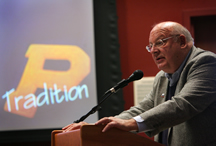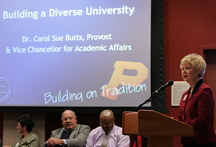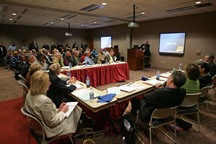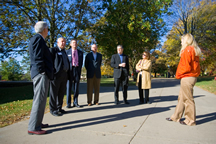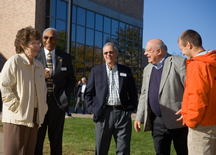PLATTEVILLE — University of Wisconsin-Platteville chancellor David Markee on Thursday welcomed the UW System Board of Regents to the campus for its October meeting and presented the board with an overview of campus life, both past and present.
“We believe we are strategically focused, with an eye on the future needs of our students and their success as contributing citizens of their communities and our increasingly global society,” Markee said.
Markee was joined by several presenters who described UWP’s efforts to diversify its campus.
In his presentation, Markee said UW-Platteville, located in the southwest corner of the state, has its origins in the Platteville Academy, organized in 1839, which later became the Platteville Normal School. In 1908, The Wisconsin Mining and Trade School (the “M”) opened and, in 1959, the Teacher’s College and Mining School merged.
Today, Markee reported, UWP offers 43 undergraduate majors, 71 minors and seven graduate degrees. Areas of emphasis are engineering, criminal justice, middle level education, industrial technology management and agriculture.
The campus facilities consist of three primary areas: the main campus with just over 330 acres and 34 buildings; the university farm, with about 450 acres and 20 buildings; and the “M,” located east of Platteville and consisting of about 90 acres.
Nearly 24 percent of students attending UWP come from the immediate six-county region surrounding Platteville and almost 87 percent of students are from Wisconsin. Just over 10 percent of students are from Iowa and Illinois; the majority of the remaining three percent of students are from Minnesota. Markee noted that UWP is a very traditional campus in that the average age of an entering freshman is 18.2 years and the average age of the entire student body is 21.8.
Increasingly, UWP is serving time- and place-bound students through its growing distance learning program, which offers online master’s programs in project management, criminal justice and engineering and undergraduate programs in business administration and criminal justice. Markee also highlighted off-site programs such as the UW-Fox Valley and UW-Rock County partnerships through which UWP delivers its mechanical and electrical engineering curricula. The distance learning program at UWP will serve 2,800 enrollees this year.
Markee concluded his presentation by directing the Regents’ attention to several strategic initiatives, including the Tri-State Initiative, which allows many students in Iowa and Illinois in several majors to attend UWP at reduced tuition costs. The Tri-State Initiative was approved by the Board of Regents in 2003 as a regional workforce initiative to fuel economic growth.
Provost and Vice Chancellor Carol Sue Butts highlighted three programs, which she said “provide opportunities for our students to interact with people who are different from themselves.”
The Nehemiah Community Development Corporation is a Madison-based youth empowerment organization dedicated to help students of color rise above poverty and welfare. UWP has hosted children, parents and staff of Nehemiah as they meet with UWP students, tour the campus and prepare for college and pre-college programs, Butts said. UWP students, staff and faculty have also traveled to Nehemiah over the years for informational sessions and to meet with prospective students, their parents and Nehemiah personnel.
In 2001, UWP formed a partnership with Mississippi Valley State University (MVSU) in Itta Bena, Miss., an institution also aiming to increase diversity for its students and employees. Butts pointed out that UWP and MVSU share many similarities: large programs in education, criminal justice, chemistry and music; both are in a rural setting and both face unique economic challenges; both have a large number of first generation college students; and both have similar rates of racial diversity.
“Through this partnership, it is hoped that the ethnic homogeneity of each campus can be tapped as a resource to promote cultural diversity on the other campus,” Butts said.
A third initiative is the Jamaican Education Partnership, which began in 2004. Education students from UWP travel to Jamaica annually to teach reading in the primary schools. Additionally, students from Bethlehem College in Kingston have traveled to UWP to student teach in the Platteville area.
Other diversity efforts were outlined by Carlos Wiley, director, Multicultural Educational Resource Center (MERC), Tammy Salmon-Stephens, director, Women in Engineering Program, and Barb Daus, executive director of international programs.
Wiley discussed “Paths to Platteville” and UWP’s pre-college programs, two programs developed in the past few years to increase enrollment of students of color. Wiley said that MERC has also instituted a racial identity program, open forums and leadership training and mentor programs to assist UWP in retaining students of color.
The Women in Engineering Career Day, Mentor Center and “Engineering a Girl” tool workshops were the main points in Salmon-Stephens’ presentation. Each is designed to increase recruitment and retention rates for women in the College of Engineering, Mathematics and Science.
The final speaker, Daus, spoke of UWP’s efforts to internationalize the campus through study abroad, exchange partnerships with 10 schools and individual faculty exchanges. Daus highlighted the program at the South Central University for Nationalities in Wuhan, China, which offers students an opportunity to earn a Master of Science in Education degree and to finish the last semester in residence at UWP.
“Is there more to come? We hope so – not only with this partner, but with our other partners,” Daus said. “Internationalization at UWP means more students abroad, more international students at UWP and involved faculty and staff who make changes to their curriculum to reflect these global experiences.”
Regent Judith Crain of Green Bay wondered if the campus finds it challenging to interest younger female students in future engineering careers.
Salmon-Stephens said technology helps to share more information with students, and to help them understand the applications of an engineering degree. She added that parents and teachers are important in encouraging younger students to consider their college and career options.
Regent Jeffrey Bartell of Madison asked about the future goals of the campus partnership with Mississippi Valley State University. Markee said campus leaders are working with the campus to align priorities and ensure resources are allocated to fulfill them.
“It’s a very positive and healthy relationship,” Markee said. “I think we’re all better in understanding what we need to do to make diversity work.” Faculty and staff have been supportive of the diversity initiatives, but admitted they were surprised at first. Students are also aware of that commitment.
Regent Jesus Salas of Milwaukee applauded UW-Platteville’s partnership with Mississippi Valley State University, as well as the institutional efforts to improve campus climate. He pointed out that UWP has the fewest students of color of any campus in the system, and he and Chancellor Markee agreed that there is still a lot of work to do in this regard. But Markee and Carlos Wiley said they believed the diversity initiatives will have an effect on students, and ultimately, improve the campus climate.
Wiley said the Tri-State Initiative is becoming popular in the immediate area around the campus, but also in urban areas in the larger region.
“I am very optimistic,” Wiley said. “As I look at the retention, and what we’re doing, it’s going to have a great impact on students, and those students are going to have a great impact on each other.
Regent Charles Pruitt of Shorewood noted that the Tri-State Initiative was met with some concern when it was first presented to the Board for approval. But today, he said, it’s clear that the initiative generates revenue, has expanded enrollment, expands and increases diversity and hasn’t displaced a single Wisconsin student.
Markee added that Tri-State students are achieving even greater academic success than traditional UW-Platteville students – an unexpected and welcome surprise.
— Evelyn Martens
Growth expectations drive campus planning for now — and the future
UW-Platteville is carefully planning campus facilities to be able to meet the needs of a rapidly growing student population, Regents learned Thursday.
In a joint session of the Board’s Business, Finance and Audit, and Physical Planning and Funding Committees, Steve Zielke, UW-Platteville vice chancellor of administrative services, provided an overview of the campus facility development plan.
Zielke described UWP’s physical, program and enrollment attributes. Enrollment has increased 20 percent since 1997, and UWP currently serves 6,277 on-campus students, which is the largest enrollment in UWP’s history. Within seven to eight years, UWP plans to grow enrollment to 8,000 on-campus students.
“We will continue a commitment to in-state students,” Zielke said. “We plan to serve a minimum of 6,000 in-state students each year.”
UWP believes increasing enrollment benefits the local and state community, he said. Zielke outlined four key benefits of more students at UWP: more educated students into the Wisconsin workforce; more local jobs as UWP hires additional faculty and staff; more opportunities to develop new academic initiatives; and the ability to develop facilities to accommodate 21st-century graduates.
In discussing recent structural updates to the UWP campus, Zielke said the Pioneer Student Center has tripled in use over the former student center, and almost tripled in sales.
He said that by adding artificial turf to the Pioneer Stadium, the field has gone from holding 10-12 events every year to over 100 events per year from partnerships with local public schools to UWP intramural sports, which have grown in popularity.
Following the renovation of Ullsvik Hall, Zielke said it will become the “gateway onto UWP,” because all of the publicly used offices will be housed in Ullsvik Hall after the renovation. It will also hold office space and classrooms for the criminal justice program, the business and accounting program and the Distance Learning Center.
According to Zielke, Ottensman Hall was built to hold 850 engineering students. UWP, with about 1,600 engineering majors currently, needs a new engineering facility, and they have plans to build one near Southwest Hall. Zielke explained the ways the university would raise money for these projects, stating that it has now raised $33 million of the $53 million necessary for Ullsvik Hall and the new engineering facility.
Zielke emphasized that the most critical updates that need to occur at UWP are Ottensman Hall and Karrmann Library.
“The primary focus of our development plan is to better serve our students with an enhanced environment conducive to learning in preparation for the challenges and demands of the future,” Zielke said.
–April Schmidt
Unprecedented success for UW-Platteville Foundation
UW-Platteville is raising more money and securing more planned gifts through its foundation than ever before, Regents learned Thursday.
“We have enjoyed help from virtually every corner of campus and the outpouring of support from our retired faculty and staff has been nothing short of incredible,” said Dennis Cooley, director of the UWP Foundation.
Cooley reported that the UWP Foundation’s Planned Giving Program has grown. The program totals $31 million through July 1. UWP generated more than $15 million of that total during the 2005-06 academic year and $5-5.5 million in the 2006-07 academic year.
“Over the past three years, we’ve rededicated the Foundation to visiting alumni in the best position to assist the university, both now and in the future. It’s also great to see alumni and friends who find their way back to Platteville in ever-increasing numbers,” said Cooley, as he introduced top givers and the various programs recently initiated by the UWP Foundation.
For example, he talked about the “M” Step Project, created to raise funds for a room in the new engineering building by selling the steps of the Platteville Mound to UWP friends and alumni. Cooley mentioned the Lindloffs for their support in industrial studies and athletics; the Wunderlins for their support of engineering programs; and the Hansons for their support of agricultural programming. Strand Associates received a special mention because several employees there pooled money in support of a room in the new engineering building named after Ted Richards, the company’s owner. He briefly explained the Platteville 1866 and 2016 funds that will be used to support structural upgrades and remodeling around campus; the 5x5x5 Program that will provide up to $5,000 for five students for up to five years; and the Community Scholarship Program that collects scholarship money for students from communities to which donors have given. Cooley also highlighted appeals to current and former faculty and staff for contributions to UWP.
Cooley said the Foundation has worked hard to rejuvenate the UWP Board of Directors. The board currently consists of 30 members, more than half added in the last three years. The board consists of seven active committees, and they hold events instead of board meetings to recognize students, faculty, staff and campus achievements.
“The key for us at UWP and in the Foundation is to find innovative ways to satisfy our UW System and elected officials, while protecting our growth through endowments and subsequent sound investment policies,” Cooley said. “We look forward to continued dialogue on this subject as it especially affects the small- and mid-sized campuses that form such a vital part of the UW System.”
— April Schmidt
Regents to consider formally opposing proposed marriage amendment
A proposed amendment that would add the state’s definition of marriage as between a man and a woman to the state constitution could further hurt the university’s ability to recruit and retain faculty and staff, members of the Business, Finance and Audit Committee stressed Thursday when approving a resolution that would formally oppose the proposed constitutional amendment.
UW System Legal Counsel Patricia Brady reviewed the possible impacts of the proposed amendment on marriage, noting a clause that would not allow Wisconsin to recognize a legal status “identical or substantially similar” to marriage. This leads to “uncertainty” about what benefits the university or state would be able to provide to employees, she said.
Current state law prohibits the UW System from offering domestic partner benefits, putting the state at a competitive disadvantage in recruiting and retaining university employees. UW-Madison is the only member of the Big Ten that does not offer such benefits to its employees.
Regent Charles Pruitt of Shorewood reminded the committee that the Board has already taken a position affirming the importance of offering domestic partner benefits.
“We took that position on the basis of fairness and competitiveness,” Pruitt said. “The current Legislature sees things differently, and that’s certainly their right. But times have changed and this amendment could certainly tie the hands of future boards and Legislatures.”
Student Regent Tom Shields of Oshkosh said that students and academic staff representatives have passed similar resolutions.
Regent Brent Smith of La Crosse said he has heard concerns from campus representatives about how the lack of domestic partner benefits negatively impacts recruitment, retention and the overall working atmosphere.
“Without a doubt, they would urge us to approve this resolution,” Smith said.
Several representatives of Wisconsin businesses testified to the committee about the importance of offering domestic partner benefits.
Carrie Madson, vice president for human resources at Foot Locker.com/Eastbay, which has locations in Wausau, Green Bay and Oshkosh, said changes in one of the company’s local insurance plans left it unable to offer domestic partner benefits for a period of time.
Madson said now that the company has negotiated the ability to be able to again offer these benefits, the company makes them available to all domestic partners.
“When we were unable to offer domestic partner benefits for a short time, we did lose some key people,” she said.
Mary Ann Reichling, of Lands’ End, said the company added domestic partner benefits as an option for its 3,000 full-time employees four years ago.
“We did feel like we weren’t very competitive in attracting some candidates for key positions without offering these benefits,” she said.
Lands’ End does not offer benefits to domestic partners of the opposite gender because of the opportunity for marriage, and does require employees eligible for these benefits to sign a declaration of domestic partnership.
“We want to treat individuals fairly,” Reichling said.
Jennifer Alexander, president of the Greater Madison Chamber of Commerce, said her organization considered both social and economic considerations in recently taking an official position opposing the state’s proposed marriage amendment. She said the Madison area is home to many high-tech businesses, including university spin-offs that attract educated workers who prefer environments that are open and welcoming.
“‘Uncertainty’ is not a word that businesses generally embrace,” Alexander said. “Competing in a globally competitive economy is largely about workforce. Our businesses were very concerned about that competitive nature. Our board felt that we couldn’t afford to discourage a single worker.”
The full Board of Regents will consider the resolution on Friday.
Business, Finance, and Audit Committee: Regional collaborative leads to cost savings, student access
Wisconsin has saved nearly $7 million in recent years by participating in cost-savings programs offered through a regional higher education collaborative, and opportunities exist to save even more, the committee learned Thursday.
The Midwestern Higher Education Compact, or MHEC, was established in 1991 at the urging of interested state lawmakers, President Larry Isaak told Regents. The organization promotes interstate cooperation and resource-sharing among colleges and universities in 11 states, and directs programs related to costs, student access and policy research.
In addition, the collaborative allows for state legislators and academic leaders to have unique conversations about the direction of higher education, he said.
MHEC cost-savings programs include those related to technology and property insurance, among others, Isaak said. In 2004-05, Wisconsin institutions saved nearly $1 million through voluntary participation in purchasing programs for computer hardware and software, office products, and telecommunications.
Overall, Wisconsin saves less than other states, but the UW System is not able to take advantage of all the opportunities MHEC offers. For example, the MHEC master property insurance program allows participating states to pool their purchasing program. The six participating states saved a total of nearly $4 million in 2004-05, Isaak said.
The UW System was interested in participating in the MHEC insurance program, but Ruth Anderson, assistant vice president for procurement, said the Department of Administration wanted the university to remain pooled with other state agencies in a self-insurance program.
Other colleges and universities, such as the University of Minnesota, have been granted authorization from their states to participate in the MHEC insurance program, Isaak said.
Several UW campuses also now participate in MHEC’s Midwest Student Exchange Program, which makes it possible for students to attend college in other states at competitive tuition rates when space is available. Isaak said the program is designed to allow colleges and universities to offer opportunities for access that benefit both students and institutions. Over 12 years, 17,000 students in seven states have participated in the exchange program. The Board will review Wisconsin’s first year of participation in the program at its December meeting.
Isaak also described MHEC’s newest initiative, called “e-Transcript,” which allows MHEC public and private high schools and colleges to efficiently provide student transcripts at reduced costs to students and institutions. Before the launch of this program, the process to provide student transcripts was still largely on paper, Isaak said.
Isaak said MHEC also sponsors regional conferences where representatives of colleges and universities can share ideas about the future of higher education, and the role of colleges and universities in developing a state’s workforce.
John Kerrigan, a Wisconsin MHEC Commissioner and Chancellor Emeritus of UW-Oshkosh, noted that MHEC’s goals are a good fit for the UW System.
“The whole focus is what we can do better for our students,” Kerrigan said. “We have to use MHEC more in a cooperative endeavor,” he said.
In other business, the committee:
- Reviewed a report from the UW System Office of Operations Review and Audit about student academic performance standards in the contracts of athletic coaches at UW campuses;
- Accepted a report on serving adult students in the UW System using state budget appropriations;
- Learned that the Board will consider in November a budget reduction plan for the 2007-09 biennium, following instructions from the Department of Administration; and
- Heard an update about voting results on UW System Trust Funds.
Education Committee: Remedial education helps UW students succeed
Students who complete remedial education requirements are more likely to succeed than students who do not, the Board’s Education Committee learned Thursday.
Sharon Wilhelm, UW System interim associate vice president in the Office of Policy Analysis and Research, presented a host of data on the performance of students who require remedial math or English classes upon arriving at a UW System campus, the reasons students may require remediation, and programs already in place on UW System campuses to provide these students with the proper instruction.
UW System data show that, although the need for remediation among UW System students has risen in recent years, it is still significantly lower than the need for remediation in 1990. Wisconsin is below the national average in terms of the percent of students in Wisconsin require remediation.
Overall, Wilhelm reported, UW System campuses have been able to retain students who complete remediation about as well as students who entered college in no need of any remediation.
UW-Milwaukee Chancellor Carlos Santiago reminded members of the Education Committee that outside factors, like the policies of individual school districts and a UW System campus’s specific recruitment and admissions practices, contribute heavily to the need for remediation among some students.
Wilhelm also emphasized that all UW System students, regardless of their need for remediation, have the potential to succeed.
“The important thing is that our remediation programs are successful and provide a mechanism for students to succeed,” she said.
The committee also learned about remediation practices at various UW System campuses, including a detailed presentation from Gerald Greenfield, UW-Parkside’s associate provost ( ).
The Education Committee also spent time discussing potential topics that may be addressed during the 2006-07 academic year. Regent Danae Davis of Milwaukee asked her fellow committee members to consider the role of the UW System with respect to the future of higher education in Wisconsin.
Regents suggested that the committee might consider topics including diversity, transfer issues, K-12 interactions, accountability and charter schools. Specifically, the committee discussed the feasibility and practicality of a UW System-wide study of campus climates with regard to diversity.
Regent Davis stressed the importance of accountability for the results of any potential study, echoing points made earlier by UW-Oshkosh Chancellor Richard Wells, who cautioned the committee against simply paying the campus climate issues lip service.
“You have to do a study in a way where there’s a framework for it and the results are actionable,” Wells said. “If you’re going to do a climate study but have not discussed ways to move forward after it’s done, you might as well not do the study.”
In other business, the Education Committee:
- Heard a brief report by Regent Mary Cuene of Green Bay regarding a new liberal arts associate’s degree at Chippewa Valley Technical College that students could use to transfer to a UW System institution;
- Heard a report on General Education at UW-Milwaukee from Provost Rita Cheng; and
- Approved program authorizations for a as part of the International Computer Science Program at UW-Platteville and for a Global M.B.A. at UW-Oshkosh.
The Education Committee postponed a presentation on distance learning from UW-Platteville until its November meeting.
Physical Planning and Funding: UW-Madison to expand Arboretum
The Physical Planning and Funding Committee on Thursday approved a resolution that would grant authority to accept a gift that will enlarge the UW-Madison Arboretum.
The gift-in-kind of 31 acres of land from the University of Wisconsin Foundation will enlarge the UW-Madison Arboretum, Finnerud Forest, near Minocqua. The land is valued at $80,000.
In addition, the committee approved a resolution that will enable UW-Madison to lease patient care and office space on behalf of the University of Wisconsin School of Medicine and Public Health, Department of Family Medicine for the Wausau Family Medicine Residency Facility.
The full Board will consider the resolutions on Friday. In other business, the committee:
- Heard from UW Colleges Vice Chancellor Steve Wildeck that counties and local municipalities contribute $9 M annually for financial support of UW Colleges; and
- Heard from Assistant Vice President David Miller reported that the Building Commission approved approximately $10.6 million for projects at its June and July/August meetings.
Photos: Andrew McNeill
###
The UW System Board of Regents will resume its October meeting on Friday, Oct. 6, at 9 a.m. in the University Rooms of the Pioneer Student Center on the UW-Platteville campus.
Related: Read Oct. 6 (day 2) news summary

